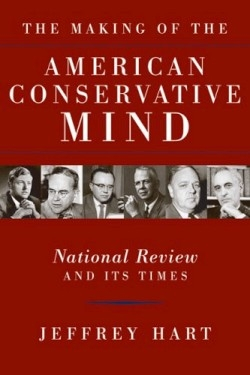
The Making of the American Conservative Mind
National Review and its Times
For half a century, National Review has been the journal of choice for conservatives to learn about the politics and culture of the times—“a magazine of ideas, an attempt to change the mind of the American intellectual elite in a conservative direction.” The author, professor emeritus of English at Dartmouth College, has written nine previous books, including Acts of Recovery: Essays on Culture and Politics. Here he offers an informed and appealing account of the people and events that have shaped N.R. into a highly regarded vanguard of modern conservatism.
Hart, a graceful writer who is skilled at explaining complex issues with a sense of both fairness and humor, is well qualified to write this book: he has been a senior editor at N.R. since 1969. He introduces the reader to William Buckley, the magazine’s founder, whom the author calls the most important journalist since Walter Lippmann. Buckley established a high standard for writing excellence, and he envisioned philosophical parameters for N.R. that still remain vital, including beliefs in free-market economics, judicial restraint, anticommunism, and a reverence of natural and cultural beauty. In addition, Hart shares his personal remembrances of James Burnham, Wilmoore Kendall, Russell Kirk, and William Rusher, important magazine contributors.
The most insightful chapters discuss National Review‘s coverage of presidents and presidential candidates. The magazine loathed Richard Nixon and did not endorse him or John Kennedy in 1960. Much attention is given to the Reagan presidency. Hart lauds Reagan for his role in ending the Cold War and for reinvigorating the United States with an optimistic spirit, and he reasonably condemns the Iran-Contra scandal and the president’s loss of control over some of his ethically challenged officials.
Former President Clinton is also fairly appraised. In addition to his sexual escapades, Hart faults Clinton for the failure of Hillary Clinton’s universal health care plan, which led to the 1994 Republican takeover of the House. The author acknowledges Clinton’s centrist governance, which reached out to Democratic and Republican moderates, and he praises Clinton for developing the weapons that were used effectively during the Afghanistan invasion following 9/11. Hart has little good to say about George W. Bush and claims that his blurring of religion and politics and the Wilsonian-like war in Iraq conflict with the tenets of modern conservatism.
This fine account of National Review and its relationship with post-World War II conservatism provides an illuminating portrayal of American politics and the dominant political philosophy of the last twenty-five years.
Disclosure: This article is not an endorsement, but a review. The publisher of this book provided free copies of the book to have their book reviewed by a professional reviewer. No fee was paid by the publisher for this review. Foreword Reviews only recommends books that we love. Foreword Magazine, Inc. is disclosing this in accordance with the Federal Trade Commission’s 16 CFR, Part 255.
